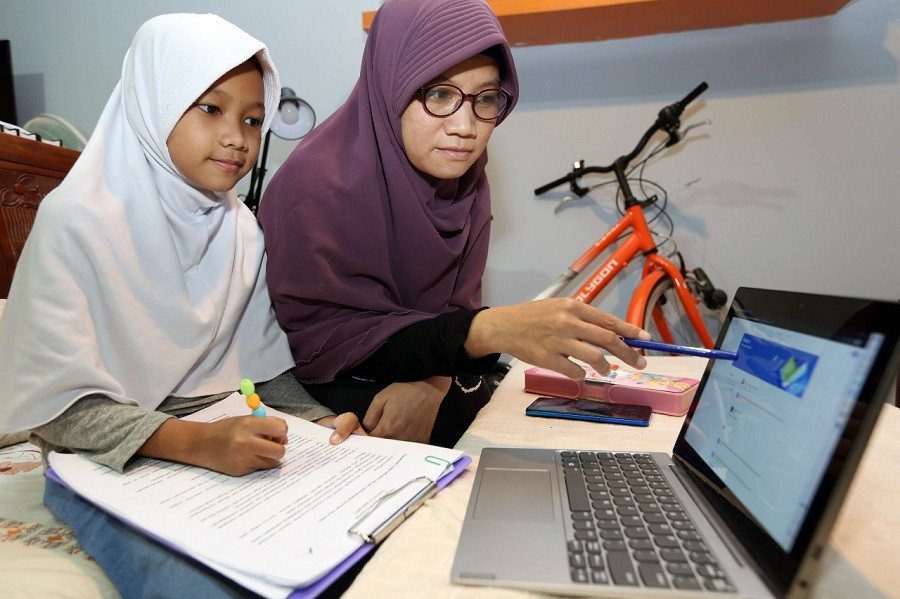When millennials raise Generation Alpha
Of the short-term effects, Gen Alphas will lack focus on daily tasks, have low vocabulary uptake and less developed communication skills, become more individualistic and have a tendency to be careless.
Change text size
Gift Premium Articles
to Anyone

T
he millennial generation may no longer count as a young generation. If the birth year for millennials starts in 1981, the first millennial cohort was 40 years old in 2020. This means that most millennials now have children, called “Generation Alpha”.
Australian researcher Mark McCrindle coined the term “Generation Alpha”, or Gen Alpha in an article published in Business Insider. Gen Alpha are people born in 2011-2025, the youngest descendants of Generation X (Gen X).
Like Gen X, members of Gen Alpha are digital natives or even the most familiar and dependent on digital technology. Suppose that most millennials use technology for work and Gen Xers use it for learning and leisure. In that case, Gen Alpha recognizes technology as their best friend during childhood growth and development.
Although acknowledged as open-minded and vigilant to the negative side of excessive smartphone use, millennial parents will still allow their children to use electronic gadgets as a necessity, since most people can’t live without them now. That’s what makes Gen Alpha the most tech-savvy compared to other generations in the current time.
Gen Alpha children who are just starting primary school must be willing to lose direct interaction with friends and other people in school in the first place. Yet, the COVID-19 pandemic seems to be a blessing in disguise, as they have quickly adapted to keeping in touch with friends and teachers through online interactions.
Conversely, millennials and Gen Zers feel that the situation has affected their mental health, as they have needed to make many adjustments, if not experience many struggles, in switching from offline to online interactions.
Exposure to gadgets since early childhood, unfortunately, has both positive and negative effects.
In terms of the positive impacts regarding self-protection, Gen Alpha has been the most persistent in maintaining their emotional stability during the pandemic. In other words, Gen Alpha might not be that cranky in facing an environment that requires them to stay at home.
Yet, that doesn’t mean they’re safe, even when they are at home 24 hours. Gen Alphas stand to lose a lot in the future. This downside could transform into short-term and long-term side effects as regards their excessive exposure to electronic devices.
Of the short-term effects, Gen Alphas will lack focus on daily tasks, have low vocabulary uptake and less developed communication skills, become more individualistic and have a tendency to be careless.
This could happen since their reality of childhood memories are poured, if not dumped, into the digital realm.
Of the long-term effects of this excessive exposure to digital devices, Gen Alphas will be prone to pursuing instant gratification and thus be unappreciative of life as a process.
Millennials who were raised in an authoritarian way by baby boomer parents realize that the parenting model they inherited needs adjustments, if not an overhaul. In line with the relatively better education they have achieved, the millennial parenting model looks a bit more relaxed. Many seem to be attempting to mix and match past models as they see fit for their Gen Alpha kids in the current situation.
In other words, they have created a hybrid parenting model. The term “hybrid” is defined as a blend of at least two divergent things. The term has also been used to understand how cultures mix in society and how they influence one another (H. Bhabha, 1994).
Additionally, millennials have developed confidence and resilience to openly communicate their tailored parenting model according to their children’s condition. However, this flexibility could be a double-edged sword, since millennial parents are becoming complacent over device usage, meaning that they are deliberately neglecting excessive gadget use by their children.
On the other hand, excessive screen exposure among children has not, unfortunately, been taken seriously. It is indeed effortless for young parents to give hours of screen time to their children because they need to run errands. But if millennial parents want their children to not be trapped in online realities, they really have to compromise in such circumstances.
The easiest way to solve this seems to limit screen time for children. Unfortunately, limiting screen time per se is inadequate to prevent Gen Alphas from developing the long-term effects as mentioned above.
Considerable scientific evidence provides guidelines for limiting children’s exposure to electronic gadgets. These guidelines can indeed be used as a reference, but they are not the only solution to reduce the long-term effects of excessive gadget use.
An additional suggestion is for millennials to provide vital intervention through periodic brainstorming sessions with their Gen Alpha children. It is, of course, not enough to offer brainstorming in one or two sessions.
Millennial parents are encouraged to go the extra mile, specifically by investing more time in accompanying their children, either in digital learning activities that involve physical movement or closeness.
Looking at the myriad learning sources currently accessible, these measures don’t seem too difficult for millennial parents to execute.
***
The writer is a lecturer of communication at Almamater Wartawan Surabaya Communication Studies Institute (Stikosa AWS), Surabaya.









